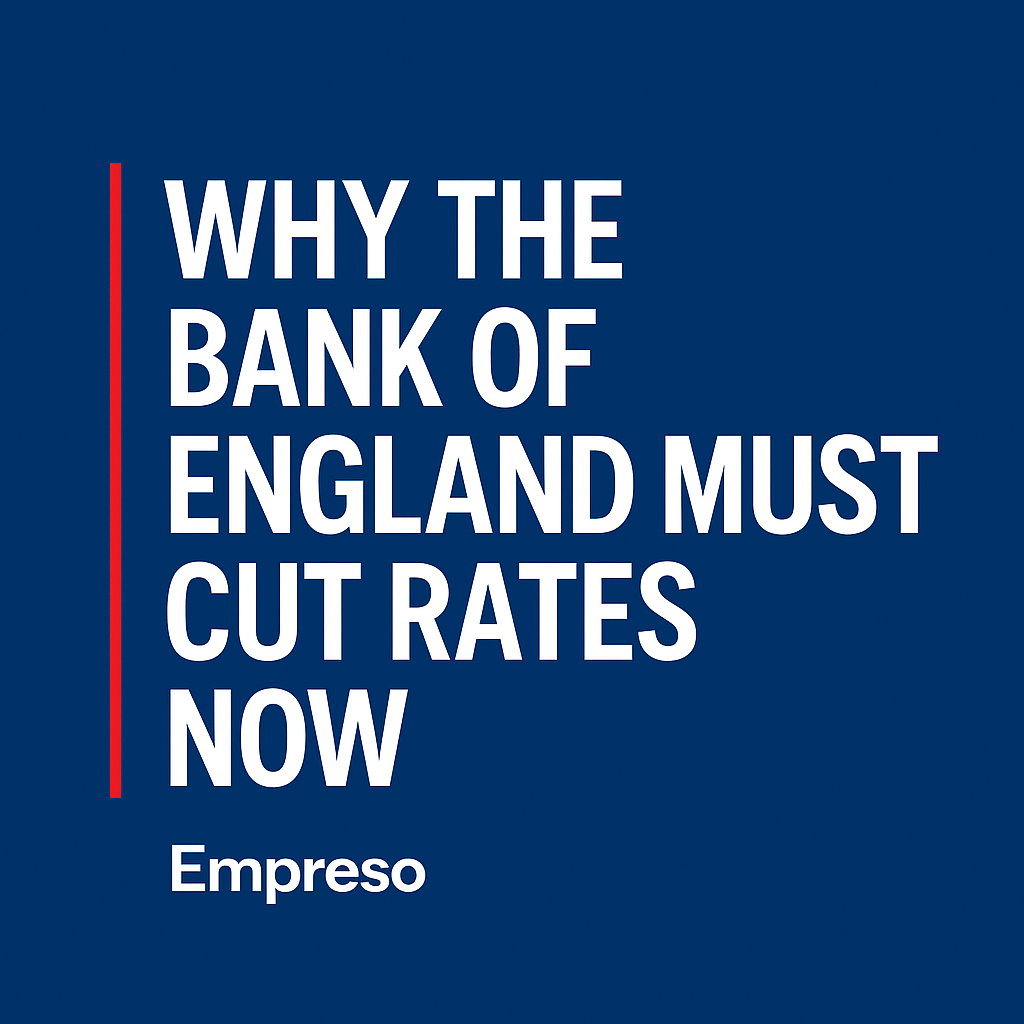
For decades, the Bank of England (BoE) has seemingly taken its lead from the US Federal Reserve, reacting in parallel or shortly after America’s rate decisions. While some alignment in global monetary policy is expected in an interconnected economy, it’s increasingly clear that this habit of mirroring the Fed is becoming deeply harmful to the British economy—and devastating for everyday borrowers.
With interest rates stuck at 4.25%, the UK is walking into a storm of financial distress. Homeowners are falling off fixed-rate cliffs, growth is stagnating, and inflation—once the central concern—is already tamed. And yet, the BoE waits.
It’s time for the Bank of England to stop looking across the Atlantic for permission—and start acting for Britain.
A Pattern of Imitation: The BoE’s Historical Deference to the Fed
📉 The Data Tells the Story
Historically, there is ample evidence that the BoE has shadowed the Fed’s moves:
- 2004–2007: As the Fed raised rates from 1% to 5.25%, the BoE moved in tandem, raising from 3.5% to 5.75%, largely due to external pressures despite different domestic needs.
- 2008–2009: Both banks slashed rates to near-zero during the financial crisis, but the BoE’s prolonged post-crisis hesitation to tighten also echoed the Fed’s wait-and-see stance.
- 2015–2018: The Fed began raising rates in 2015. The BoE didn’t follow until 2017—only once the Fed had proven the coast was clear.
- 2022–2023: With inflation surging post-COVID, the Fed’s aggressive hikes forced the BoE to follow suit, pushing the UK base rate from 0.1% to over 4% despite signs the UK economy was less resilient.
This reactive strategy has created a dangerous dependency. Instead of tailoring interest-rate policy to Britain’s unique challenges, the BoE often acts like a junior partner—not a sovereign policymaker.
The UK Is Not America
Let’s be absolutely clear:
The United Kingdom is not the United States.
We do not have:
- The same consumer spending resilience
- The same fiscal firepower
- The same level of wage growth
- Nor the same property market dynamics
In the US, homeowners benefit from 30-year fixed mortgages, providing protection from interest rate swings. In the UK, most homeowners are on 2- or 5-year fixed terms, and millions are now due to remortgage—facing increases of hundreds of pounds a month.
The Borrower Squeeze Is Becoming a Crisis
This isn’t a minor economic adjustment—it’s a looming national emergency.
According to UK Finance:
- Over 1.5 million fixed-rate mortgages will mature in the next 12 months.
- Monthly repayments could increase by £400–£500 per household.
That’s a cumulative shock to the economy—draining spending power, increasing defaults, and eroding mental health and social stability.
What was promised as temporary pain to bring down inflation has turned into prolonged suffering.
And yet, the inflation genie is back in the bottle—with headline inflation now below 3%.
So why are borrowers still suffocating?
The Federal Reserve Has Different Priorities
The US Federal Reserve is managing an entirely different economy:
- The US dollar is the global reserve currency.
- American consumer spending remains robust.
- The US economy has shown overheating trends in some sectors.
- Elections and political cycles influence fiscal confidence and job creation.
In the UK, meanwhile, we face:
- A cost-of-living crisis
- Stagnant productivity
- Sluggish wage growth
- A housing market on the edge of disarray
Simply put: what’s good for America is not necessarily good for Britain.
The BoE’s mandate is to serve the British economy, not to mimic US policy in fear of upsetting global bond markets or spooking currency traders.
What the UK Needs Is a Proactive Cut—Now
The Bank of England must show courage and leadership by cutting interest rates rapidly and decisively.
This would:
- Relieve pressure on millions of households approaching remortgage cliffs
- Boost consumer confidence and free up spending
- Help revive the property market
- Stave off recession and avoid a credit crunch
Let’s not forget: central bank policy isn’t just about suppressing inflation.
It’s also about supporting growth, maintaining financial stability, and enabling broad-based prosperity.
An Opportunity to Rebuild Trust
Public trust in institutions like the BoE is on shaky ground.
If the Bank continues to appear disconnected from the real-world pain felt by millions of British families, it risks losing the very credibility and legitimacy it relies upon.
A bold, decisive rate cut would say:
“We hear you. We see your struggle. And we’re acting in your interest.”
This isn’t about populism.
It’s about pragmatism and policy that fits the facts on the ground.
We Need Courage, Not Conformity
The time has come for the Bank of England to break its habit of shadowing the Fed and instead lead for Britain.
By clinging to high interest rates to preserve global alignment, we risk:
- Driving thousands into mortgage arrears
- Deepening inequality
- Prolonging economic stagnation
A rapid and meaningful base rate cut is not just an economic necessity—it is a moral obligation.
Because what good is monetary stability
if it comes at the cost of human instability?
💬 Speak to a Mortgage Advisor Today
If your fixed-rate deal is ending soon, or you’re already feeling the pressure of rising repayments, you don’t have to navigate this alone.
Speak to one of our qualified Empreso mortgage advisors for a free, no-obligation review of your options. We’ll search the market and help you find the best available deal—often including exclusive rates not available on the high street.
👉 Request Your Free Mortgage Consultation
✍️ About the Author
Alain Mbe is a UK-based property entrepreneur, mortgage advisor, and founder of Empreso—a purpose-led network that empowers individuals to build prosperity through property, finance, and protection. With 25+ years of experience and a passion for making complex matters simple, Alain blends financial insight with a commitment to social impact.

